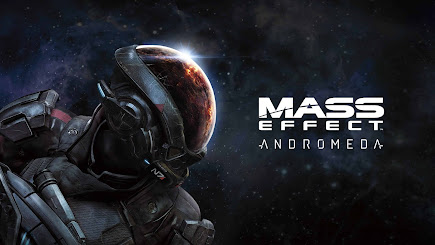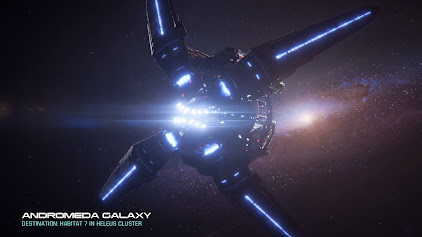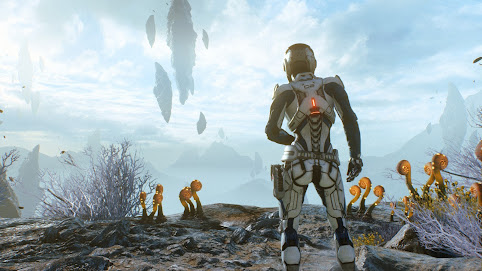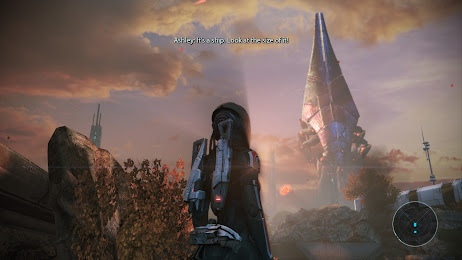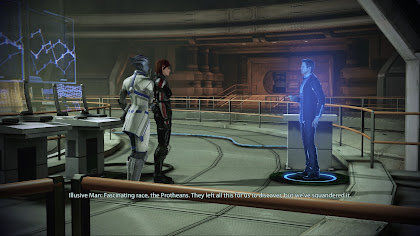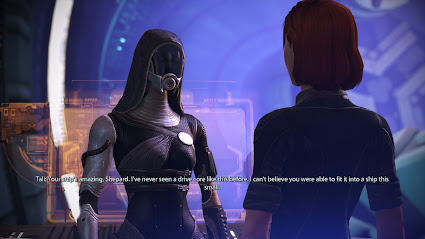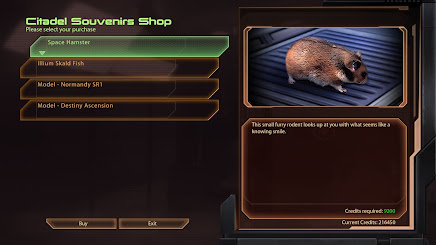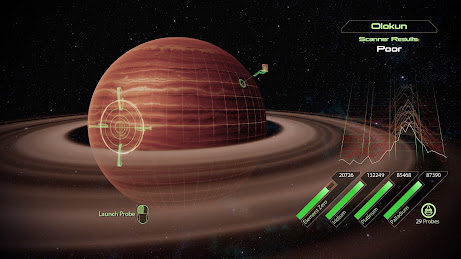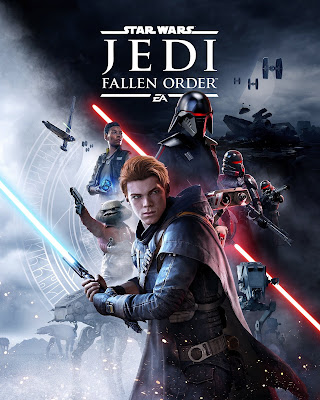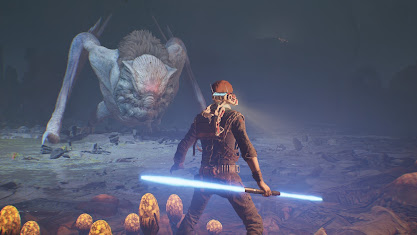Electronic Arts and subsidiary BioWare have announced the release date for the latest Dragon Age fantasy RPG. The video game, recently retitled Dragon Age: The Veilguard, is due for release in autumn this year. They have also released a gameplay trailer.
Tuesday, 11 June 2024
Electronic Arts announce release window for new DRAGON AGE game
Wednesday, 8 November 2023
BioWare unveil teaser for fifth MASS EFFECT game
BioWare have unveiled a brief teaser for the upcoming fifth game in the Mass Effect franchise.
As part of N7 Day - an annual celebration of the franchise derived from the N7 special forces group in the video games - BioWare released a series of text and video bursts teasing a new clip. Once fans had done some detective work, the full clip was posted as above.
The accompanying text (in the original files) suggests that the next game in the series takes place in or after the year 2819, the year that Mass Effect: Andromeda took place in, and a distress call from the Andromeda Galaxy has been detected. The text also suggests that the Systems Alliance, the Earth-led human faction in the Mass Effect universe, is still extant. The original Mass Effect trilogy concluded in the year 2186, for reference.
BioWare and parent company Electronic Arts confirmed some years ago that a new Mass Effect game was in development. However, it is still likely some years off; the company is currently working hard to get Dragon Age: Dreadwolf finished for its likely 2024 launch and will only turn its full firepower towards Mass Effect 5 (or, more likely, Mass Effect Colon Dramatic Subtitle) after that game comes out.
The Mass Effect franchise was launched in 2007 with the titular original game; it was followed by Mass Effect 2 (2010) and Mass Effect 3 (2012). The three games are notable for combining into one very large mega-game where players can guide their characters through almost 100 hours of an epic space opera war story, in which humanity and the other races of the Milky Way are plunged into war against an ancient alien threat, the Reapers. In 2017 BioWare released Mass Effect: Andromeda, a spin-off story set more than six centuries later in the Andromeda Galaxy. However, the game garnered a lukewarm reaction from fans and middling sales. BioWare decided not to proceed with a direct sequel, despite the game setting one up. In 2021 they released Mass Effect: Legendary Edition, a packaging of all three original games into one title with some upgrades to the graphics and controls.
It sounds like the new game will take place in the Milky Way again and will have to decide which one of Mass Effect 3's endings is canon. However, by taking place after Andromeda, it may also be able to resolve some of the unresolved story threads from that game.
Although teasing a new Mass Effect game is welcome, fans have also taken advantage of N7 Day to criticise the lay-offs of numerous developers from the company in the last few weeks, including some of the last original team-members from the Baldur's Gate franchise (an interesting look after Baldur's Gate III launched back in August from Larian Studios and was a massive critical and commercial success of the kind that BioWare has not enjoyed in over fifteen years), as well as QA staff after they voted to unionise (although BioWare have pointed out that was a decision by their contracted company rather than BioWare themselves).
It's fair to say that an enormous amount is riding on the success of both Dragon Age: Dreadwolf and Mass Effect Next: BioWare have not had a really big hit since the release of Dragon Age: Inquisition nine years ago, and the company has since been haemorrhaging fans, critical acclaim and its creative firepower.
Friday, 26 August 2022
Amazon possibly lining up to buy Electronic Arts
News broke this morning (via GLHF and USA Today) that Amazon had reached a deal to buy video game publisher Electronic Arts. GLHF then offered a clarification that the deal might not be announced today or, indeed, will happen at all, leaving the video game press in a state of confusion.
Electronic Arts are one of the biggest video game publishers in the world, known for a battery of major franchises including FIFA, Need for Speed, The Sims, Medal of Honor, Command & Conquer, Dead Space and Battlefield, and, via their subsidiary BioWare, Dragon Age and Mass Effect. Through recent acquisition Codemasters, they also picked up the lucrative Formula One tie-in licence. Until recently they also held exclusive rights to Star Wars, releasing hit games The Old Republic, Battlefront 2, Star Wars: Squadrons and Jedi: Fallen Order. They will continue making Star Wars games moving forwards, but on a non-exclusive basis.
EA have been searching for a buyer as part of a wider consolidation movement in the video games industry, which has seen Bethesda and EA's arch-rivals Activision snapped up by Microsoft. Microsoft reportedly were unwilling to consider acquiring EA whilst their Activision acquisition is incomplete. EA reportedly entered communications with Disney, Apple, Amazon and Comcast/NBC Universal, with Comcast/NBC apparently strongly interested.
Amazon have been making various attempts to enter the video game space, mostly through acquiring video game streaming service Twitch in 2014. Various attempts to launch their own video games label have floundered, apparently due to the company wanting faster results with a quicker turnaround than the industry is really capable of generating. An Amazon-EA merger would make a lot of sense, although it would also likely generate legal concerns over monopolies, and gamers would be concerned over what this would mean for EA's recent tactical alliances with Microsoft and Steam, that saw EA games become available via Xbox Game Pass and the Steam storefront.
Whether this announcement was premature - Amazon and EA have made a deal and are waiting for the paperwork to go through, and GLHF jumped the gun - or if was totally erroneous, is unclear.
Thursday, 7 July 2022
Mass Effect: Andromeda
The year 2819. 634 years ago, the Andromeda Initiative launched five space arks and a huge mobile space station towards the Andromeda Galaxy. 100,000 settlers from a dozen races were placed in cryo-suspension and a cutting-edge FTL telescope identified half a dozen "Golden Worlds" in the Heleus Cluster for colonisation. However, something has gone wrong. The golden worlds are now desolate and ravaged by radiation or ice or heat. Strange ruins guarded by robots can be found on many planets, and a hostile alien race, the Kett, have invaded and seem to be determined to subjugate the cluster and its native race, the Angara. Low on fuel, food and supplies, the Andromeda Initiative has to work hard just to survive. The human Pathfinder, Ryder, is given their own ship and a tough crew to help the expedition survive. There is no going back.
Andromeda is the fourth game in the Mass Effect series and, as the lack of numeration hints, also a soft reboot of the franchise. The original Mass Effect trilogy told one story that over hundreds of choices made over three games until different players could have wildly different outcomes to their versions of Commander Shepard's battle against the Reapers. As a result, to avoid "canonising" any of these choices, Andromeda moves the action 2.5 million light-years away to our nearest big galactic neighbour. Plenty of familiar races, technology and terms show up, but no familiar characters. It was definitely a bold solution to the problem.
Andromeda also shifts gears in terms of format and genre. The first three games were linear action-RPGs, dramatically increasing the action quotient and dialling back the RPG systems as the trilogy went along. Andromeda reverses that move, having more RPG, customisation and advancement systems than any game in the series to date. It also takes a leaf out of the original Mass Effect (2007) by focusing on exploration as a key mechanic, although a much simplified version of the search for resources mechanic from the second and third games is also present. There is also much more of an open-world feel to the game this time around, complete with large, expansive maps with lots of side-quests to undertake and collectibles to find.
The changes were controversial with fans, who felt that the success of the Mass Effect series is rooted in linear storytelling, focused characterisation and a relatively constrained playing time (each game in the Mass Effect trilogy clocks in at around 30 hours). Making Andromeda into an open-world game taking comfortably more than twice that long to complete was always going to be divisive, not helped by Andromeda certainly not having the sharp writing of the series at its best. The game also suffers from having to dial down the huge events and epic storytelling from Mass Effect 3 (2012) and start building a new narrative from scratch. After the huge events of Mass Effect 3, Andromeda feels small again which some took as a good thing (you can't really beat Mass Effect 3 for scale, and it'd be foolish to try) but others took as a sign of a lack of ambition.
Structurally, the game starts out as normal for BioWare: an early, linear section acts as a tutorial and also an introduction to the story and characters. You play either Scott or Sara Ryder, the twin children of Alec Ryder. Alec is a Pathfinder, a special exploration/reconnaissance specialist whose skills are boosted by the presence of an AI in his brain, named SAM. After choosing which twin to play, the other one is unceremoniously boosted into a cryo-tray malfunction coma, which feels like a bit of a wasted potential (the option to play both twins in co-op would have been welcome). Anyway, Ryder Jnr. quickly inherits their father's super-AI and becomes the new Pathfinder.
Once the initial linear section is over, the game opens up and you have the option of taking on new quests on the Nexus - the mobile space station that serves as this game's answer to the Citadel - and then shooting off into space on the Tempest, the game's equivalent of the Normandy. The Tempest is a much smaller but, it has to be said, far more swish spaceship and it's genuinely more fun to explore, hang out and shoot the breeze with your companion characters (who have far, far more to say than their original trilogy counterparts) before carrying out missions. You can explore the map of the Heleus Cluster, scanning planets from orbit for resources and supplies, and also land at will on five planets. In the biggest shift in format for the series, each one of these five planets is an absolutely enormous map across which you can explore in the Nomad, this game's equivalent of the Mako.
Each planet is suffering from some kind of problem: Eos's magnetosphere appears to have been damaged, allowing harmful radiation to reach the surface. Havarl is a toxic jungle which is becoming less able to support life. Voeld is a frigid, frozen wasteland. Kadara's water supply is poisoned. Elaaden is a baking desert. These problems inhibit your ability to move around freely, restricting you to the Nomad and occasional jaunts outside. However, and most fortuitously, you quickly discover that an ancient alien race was in the process of terraforming the cluster and they have left behind huge engines hidden below the surface of each planet. Thanks to your SAM interface, you can activate these engines and bring each planet back to habitability. When you do so, the environmental problems clear up and you can found colonies on each planet.
Of course, you are not alone. Early on you meet the Kett, a hostile alien race which sees other species purely as resources that can be consumed, barely at the level of animals. This allows you to murderate the Kett on sight without guilt (always handy in a game built around lots and lots of combat), although to be fair the Kett do get some more development later on in the game that makes them both more hateful as enemies but also opens the possibility of negotiation, at least with some factions. The Kett are definitely not on the threat level of the Reapers, and are actually less advanced than the Milky Way interlopers, not having biotics or mass effect technology. Their guns hit hard, though, and they certainly have numbers on their side. They also come in a lot of varieties, with each type requiring different tactics to deal with.
More friendly are the Angara, the native inhabitants of the cluster. The Kett are the only aliens they've ever met, so unsurprisingly it takes quite a while for you to win them over as potential allies (after gaining an Angaran representative as an ally on your team). This is where Andromeda gets interesting. A game about 100,000 people showing up without warning and setting up home is effectively a story about colonisation and colonialism, a tricky subject to get right. Andromeda constantly brings up the subject, with Ryder at one point admitting to their new Angaran friend that whenever two civilisations meet in an unprepared manner, one usually ends up subsumed by the other. The legitimate Angaran concerns over whether the Milky Way newcomers are allies to help out against the Kett or potential rivals for limited resources in the cluster are given a fair bit of weight, and at different points in the story you gain and lose Angaran allies because of how the Initiative is comporting itself as it settles the planets. The game doesn't go too far down this road, as ultimately this is a game about shooting bad aliens and being friends with the good aliens, but it's good to see the subject being tackled at all.
The game's main storyline unfolds as the Initiative settles the cluster, fights off Kett attacks and manages some tricky diplomacy with the Angara. The storyline and structure encourages you to mix in main story missions with a ton of side-missions, such as helping the colonies get off the ground, tracking down supplies and trying to reconcile various "outcasts" from the Initiative who have gone rogue. You also have to find the missing other arks and track down resources like food and fuel for the organisation. There are also tough administrative choices on the Nexus, with issues like needing to bring more people out of stasis to work at solving these problems, but also in a way that doesn't exhaust current resources. You also have a personal mission to follow, as it turns out that your father had various secrets about why the Andromeda Initiative was founded and launched, and his own hidden objectives he kept from everyone else.
If that wasn't enough, the six squad-mates you pick up through the game also each have their own backstory and attendant loyalty quests to attend you. Completing these quests unlocks another tier of skills they can access in battle. You also have to manage the Initiative's APEX security squads, recruiting troops and send them off to perform missions you are too busy to deal with, as well as researching new technology to help you in Heleus. At certain points in the game you can also wake up new Initiative crew from cryo-sleep and assign them to science, military or commercial projects.
There is a lot going on in this game, far more than in any prior Mass Effect game (although you can see the descendants of Mass Effect 2's loyalty missions and Mass Effect 3's War Assets systems here). Sometimes it is exhausting and overwhelming, but a lot of it is pretty good and makes you genuinely feel like a plugged-in, senior member of a space exploration team. Trudging in from a lengthy ground combat mission on the desert moon of Elaaden to check in on how your APEX teams are doing and then invest your research points in some better armour and then assign a new science team which has just woken up from stasis can feel pretty good.
There is a thin line between "keeping you busy" and "burying you in filler makework," though and Andromeda strays across that line a few times (to be fair, not anywhere near as often as its structural predecessor, Dragon Age: Inquisition). Missions like tracking down 15 plants to scan or 15 new minerals to analyse are too tedious, and the game's immensely involved system for researching and building armour and weapon upgrades is both impressive and almost useless, since you will usually acquire comparable equipment from enemies in the field or from shops. Once you've used the terraforming vaults to save the planet Eos, you instantly know how to unlock the three Remnant ruin sites and attendant vault on each of the other planets, and it's a fairly repetitive task to undertake (with the exact same boss fight to follow). There also a few too many missions, particularly at the end of the game, which require you to visit three or four of the planets in rapid succession, which can feel like you're battling through a series of never-ending loading screens.
Andromeda also lacks the sharp writing of the best of the trilogy. Infamously, one of your crewmates is religious and when she asks you about your beliefs, your only options are to profess total ignorance of what religion is (!), immediately profess belief in a deity yourself or castigate her for believing in fairy stories. This lacks the more nuanced approach in some of the earlier games, and is fairly typical of the dialogue through the game. There is also a fair amount of implausibility about the size, scope and cost of the Initiative project (which was never mentioned once in the OG trilogy, even though it turns out several of the original characters knew about it), although to be fair the game does try to explain this later on.
Your cast of companion characters are also solid, but a little undercooked. South London geezer Liam is more fun than the bland human companions of the OG trilogy, but still doesn't really give you any reason to take him on missions. Cora is a fine human biotic soldier whose major defining character trait is that she served with an elite squad of Asari commandos, something she will shoehorn into every other conversation. She's also (very briefly) narked off because she was in training to become Pathfinder, but you usurped her position thanks to your convenient Head AI. Any potentially interesting character conflict is dealt with in about five minutes. You also have an Asari archaeologist, Peebee, whom the writers try very hard to differentiate from Liara by making her an attention-deficit, reckless, manic pixie girl (she does improve immensely over the game's length, but that first impression is yikes). There's a grizzled Krogan warrior, Drack, who starts off as a clone of OG grizzled Krogan warrior Wrex. Fortunately, Drack differentiates himself due to his sheer age and his family connections (his granddaughter Kesh is an important side-character) and ends up becoming a solid crewmate. Turian smuggler Vetra is also good fun, but the game's MVP in terms of characters is Jaal, the Angaran representative who joins your team and whose sense of humour and bewildered research into the Milky Way races is a constant source of comedy and sometimes pathos. Overall, they're a good cast but lack the punch and finer writing of the OG crew from the trilogy.
However, the game wins back a lot of goodwill through combat. Combat was very stiff in the first Mas Effect game, improved in the second and became fairly solid in the third, but never spectacular. Andromeda takes advantage of the more advanced engine and the larger areas where you will be fighting. One of the game's big selling-points is that you have a jet pack which you can use for combat and exploration, and it has to be said that it is fantastic. You can rocket up to vantage points, jump out of melee range of non-ranged enemies and execute a sharp dodge to get out of a sniper's firing line. You can level up dozens of abilities rather than just four or five and switch between them in the field. The game's frankly ludicrously huge selection of weapons and armour means you can tailor your character's combat abilities and specialities in fine detail. Simply put, Andromeda has easily the best combat in the series to date and the best mechanics and systems for tailoring your character in the way you see fit.
Andromeda is a game that sometimes feels like an embarrassment of riches and sometimes a rich source of embarrassment. The sheer volume of content should in theory mean you'll never get bored, but in practice you can find yourself tracking down just one more plant to scan at 2am and wonder what the hell you're doing. The companion characters are potentially fascinating, but their dialogue sometimes feels undercooked. The game has an immense array of systems to engage with, but they're not all worth the time. The game has fantastic combat, but the enemy can feel under-developed and not enough of a challenge. The theme of colonisation is potentially brilliant, but the story only periodically engages with it. The planets are huge and beautiful, but also full of repetitive content.
If you can work through or avoid the more disposable content of the game, its story eventually becomes quite interesting (especially as the events of the original trilogy do turn out to have more bearing on Andromeda than you first think), its combat is always great and compelling, and the game sells the wish-fulfilment fantasy of you being a space captain (more Janeway than Kirk) quite well.
Mass Effect: Andromeda (***½) can't hold a candle to the original trilogy's stronger story and characters, but by pivoting to focus on exploration and more freedom, it carves out its own identity. Somewhat underrated and well worth a look, the game is available now on PC, PlayStation 4 and Xbox One.
Friday, 24 June 2022
Mass Effect: Legendary Edition
2183. Twenty-five years have passed since humanity discovered it was not alone in the universe. The Milky Way is dominated by the Citadel Council, a multi-species authority that seeks to limit conflict and war and promote peace and trade. One soldier now stands ready to become the first human Spectre, an elite agent with the authority to destroy threats to galactic peace. But their first mission uncovers evidence of a rogue element in the Spectre ranks, and evidence that a powerful, ancient threat is returning to the galaxy after fifty thousand years. With the Council not ready to face this truth, it falls to Commander Shepard to recruit a crew of like-minded allies and expose this new threat.
If video games are about fulfilling fantasies, BioWare's Mass Effect trilogy offers one of the most compelling in the history of the medium: you are Commander Shepard, Space Adventurer. Your surname is set in stone but otherwise you can determine your Shepard's gender, appearance, abilities, sexuality and personality. You then guide your Shepard through a lengthy quest to save the galaxy, but it's up to you how you do it. You can be the ultimate hero, a paragon of honour and justice, or you can be a brutal, sarcastic antihero. Or maybe you just wing it as the fancy takes you. Depending on your deeds and words, entire civilisations will be destroyed, trusted friends may be betrayed or left for dead, and the fate of trillions of lives hang in the balance.
Most RPGs released since the trilogy have been open-world games, offering freedom in allowing you to travel across a vast landscape and mix and match quests and activities, but none have offered narrative freedom and control in this manner. You can see why, as well. It's very hard to pull off, and even BioWare themselves have shied away from trying to do it again. Their Dragon Age series has offered some of the same ideas of narrative control, but constantly changing protagonists and drastically changing locations between games has minimised the same kind of impact.
The Mass Effect trilogy is really one immense game split into three for length and pacing reasons, and the Legendary Edition of the trilogy combines them for the first time into one cohesive package. Every bit of DLC is also included (one optional expansion for the first game excepted, which almost everyone ignored first time around anyway) and all three games have been given graphical spruce-ups and had their load times drastically improved. The first game has also had its combat revamped to better match the latter two games in the series. The result is now the best way to experience the trilogy, certainly for newcomers, and seasoned hands will find a more streamlined experience as well.
The trilogy's most vital feature is that you get to create your character and take them through all three games, carrying all their decisions with them to make for one epic story. The trilogy is ostensibly made up of roleplaying games, although it ends up being more of an RPG-shooter hybrid. All three games are separated into non-combat areas, where you can pick up missions, engage in dialogue and diplomacy and usually some shopping, and mission levels, which are linear maps where you usually make your way to an objective and shoot very large numbers of people along the way. The most important stuff usually happens in the non-combat zones, where you can guide Shepard through conversations using a radial dial and picking your responses. You can also gain "Paragon" and "Renegade" responses by picking kind or aggressive replies respectively. Increase your Paragon and/or Renegade scores and you can unlock special replies, which can sometimes allow you to avoid combat by defusing situations or intimidating an opponent into backing down. This is usually where you'll decide what kind of Shepard you can be, either a hero or an antihero (you can't really be a villain) or some kind of middle ground, although those trying to have their cake and eat it may find they're locked out of the special replies on both ends of the spectrum.
Combat sees you deploy Shepard and two companions and fight in third-person. Combat is inspired by the Gears of War series, with lots of conveniently-placed, chest-high walls to hide behind and fire off shots at the enemy. Combat in the first game is fairly forgettable, improves sharply in the second game and reaches its best in the final title. You can focus on your own fight and let AI handle your companions, or you can pause and give them orders mid-combat. The three games do handle difficulty differently, so I found that Mass Effect 2 could sometimes be challenging on Normal whilst Mass Effect 3 could occasionally feel a bit too easy even on Nightmare, so tweaking difficulty levels to find the right balance is key. However, given the important stuff happens in the dialogue scenes, combat can occasionally feel like a chore. Dropping the difficulty all the way to the easiest level makes combat trivial and allows you to get on with the story.
And it's the worldbuilding, story and characters where Mass Effect shines. Mass Effect is nothing too original - imagine 1990s SF TV classic Babylon 5 mashed up with the 2003 Battlestar Galactica and you're about 90% of the way there - but it almost gleefully mixes and matches its inspirations to create something very enjoyable, if occasionally familiar. The alien races are all memorable and have their interesting foibles and cultural tics, like the third-person-referring Hanar or grumpy space dwarf Voluses, or the Elcor, whose lack of facial expressions and monotonous voices means they have to patiently explain their current emotional state at the start of every sentence. The backstory, painting humanity as newcomers on the galactic stage who are still a bit paranoid about aliens but who are also rising fast in power and influence, angering older galactic civilisations, is also rich and interesting.
The in-game story is also excellent, with you initially chasing down a rogue Spectre who has allied to a renegade race of mechanoids. The stakes get bigger and busier, and you eventually have to sacrifice a trusted friend and pull a gun on another when your relationship goes south. Eventually you discover the real threat, a Cthulhu-esque nightmare of techno-horrors from beyond the dawn of time, and have to fend off their first incursion into the galaxy with a massive space battle and a desperate battle up a burning skyscraper...and that's all in just the first game!
The story ranges far and wide across the galaxy, although players are often baffled by the turn it takes in Mass Effect 2. Trying to avoid spoilers, but suffice to say that there is a two-year gap between the events of the first two games and Shepard's warnings of the return of the Reapers have been disregarded by the Council, forcing them to join forces with a human separatist organisation with a dubious moral past but who have the massive resources needed to take the fight to a new enemy, the Collectors. The game feels like a huge side-quest from the main story arc, but it's also immaculately structured, with Shepard having to assemble a (more or less literal) Dirty Dozen of specialists in various fields, win their trust and then mount an all-out assault on the Collector home base. The brilliance of Mass Effect 2 is how closely it focuses on your relationship with the various characters: mess up your recruitment jobs and you may find some candidates will not help you, or may stab you in the back, or are so disillusioned with you that they will be killed in the final battle. Mass Effect 2 is distinctly odd when looked at in the grand context of the trilogy but it's a brilliant game in its own right.
Mass Effect 3 then becomes an all-out war story, with you right in the middle of a desperate battle for survival with entire planets falling and burning, and a desperate resistance being organised against ridiculous odds. This may sound familiar, but really, Mass Effect 3 does an almost unmatched job of putting you in a ludicrously overwhelming situation and forcing you to make very tough decisions on which the fate of the galaxy will depend. It's enough to almost make you forgive the infamously divisive ending, which tries to bring the preceding ~95 hours of great storytelling to a satisfying close and can't quite manage it. It works and more or less fits the themes of the trilogy, but it also does feel like some of the unknowable mystery set up by the first game has been dissipated by lengthy exposition scenes in the third.
The Mass Effect's trilogy's ace card is its cast of characters. BioWare had superb casts of fun characters in earlier games, all the way back to Minsc and Boo in the venerable Baldur's Gate, but it was in Mass Effect where they really nailed it. Almost every character is excellently-written, superbly-acted (Mass Effect may have cumulatively the greatest voice cast and vocal performances of any video game series, ever) and given motivations and backstory that allow you to understand where they're coming from. A few characters are a bit on the bland side - Ashley, Kaidan, Vega, Jacob - and a couple don't feel like they really fit into a Paragon-based crew (Zaeed) or a Renegade-based one (about half the rest), but overall they're a great bunch. And of course Tali, Garrus, Wrex, Liara and Javik are among the best, most entertaining AI companions you could wish for in any game. There's also a few who might annoy at first or don't appear to do much, but gradually reveals themselves to be great picks (Jack, Samara, EDI, Grunt). Forging friendships or even romances with these characters, or encouraging hook-ups between their ranks, is amusing.
So far, so good. But there are some issues. The first is that having all three games and their DLC in the same package creates some weird pacing problems, particularly in how you access the expansion missions. Arrival should really only be done after the final mission in Mass Effect 2 (it acts as a bridge to Mass Effect 3), but it's possible to trigger the mission a lot earlier and it fits very awkwardly into the timeline if you do that. Similarly, the Citadel expansion to Mass Effect 3 should be done as late in the game as possible to ensure you get to recruit the largest possible cast of characters from all three games for a reunion, but the lighthearted, comedic tone of the expansion fits awkwardly alongside the increasingly grimdark-AF atmosphere as the trilogy moves towards it conclusion.
There's also a lot of stuff that the games don't tell you that a newcomer should really know, like how regularly touring the ship between missions can unlock new conversations with your companion characters and open up opportunities to gain Renegade or Paragon points, or unlock new missions or "war assets" for use later on in Mass Effect 3 (Legendary Edition carries forwards more decisions from the first two games to help you in the third).
There's also the fact that although BioWare tinkered with how the OG Mass Effect works, they don't bring it fully in line with the other two games. Mass Effect is an RPG with a shooter combat mode, whilst Mass Effect 2 and 3 are much more shooters with RPG conversations. The difference is that Mass Effect has non-combat skills and more areas where combat and conversations mix, whilst the other two games only have very modest skill trees and much more clearly delineate their non-combat and combat areas. Mass Effect feels a bit out of keeping with the other two games and not fully integrated into how most of the series works, so the unified experience of playing all three games remains uneven (although less on this time around).
There's also the issue with minigames. Mass Effect 1 and 2 have laborious minigames for lockpicking and hacking, which are both tedious and should be dumped. Mass Effect 3 swaps them out for it simply taking a while and having to make sure nobody's shooting at you at the time. All three games also have an exploration mechanic which they handle differently. Mass Effect 1 has you driving around planets in the Mako, an inexplicably bouncy tank, looking for minerals and (very rarely) shooting bad guys. There's also identikit buildings - seriously, it's worse than Dragon Age II - you can sometimes clear out of enemies and loot. Exploring all these optional planets takes forever (literally 50% or more of Mass Effect 1's total playtime if you're going for an exhaustive run) and isn't much fun.
Mass Effect 2 ups the ante with mineral scanning, which means you sit in orbit around planets and move the mouse around looking for minerals. It sounds and plays very dull, but is important to build up minerals for the final battle in the last game. Again, if you go for an exhaustive, 100% playthrough you will probably spend at least five hours accruing far more resources then you will ever need.
Mass Effect 3 has a much faster and more modest scanning game where you go looking for war assets to use against the Reapers. It's a bit more hit and miss, but it's fun to track down missing fighter squadrons or a damaged cruiser which can they rejoin the fleet for the final battle.
Another issue is that some storylines have not aged gracefully. Various cliches like genius autistic characters (who are then subjected to abuse and torture), wish-fulfilment hot alien space babes (some of the costume choices in the game were corny when the games came out, let alone now) and villains who are villains because villains rear their head from time to time and will make you roll your eyes as often. The games do improve immensely over this, sometimes fast enough for the third game to mock some of the decisions from the first.
The biggest weakness of the trilogy is probably how it is divided into distinct "roleplaying" and "shooting" modes. The meat of the game is in the roleplaying sections and the shooting can sometimes feel rote and phoned in, a simple way of adding "more gameplay" to the series. The more hardcore RPG fan, especially those familiar with BioWare's earlier Knights of the Old Republic SF RPG, will bemoan the way tactical, squad-based combat has transformed into real-time twitch shooting. The games sometimes awkwardly move between the two modes and it can be odd seeing a Paragon Shepard extolling the value of all life and then five seconds later is gunning down forty enemies in rapid succession, gaining achievements for the number of people they massacre and set on fire. At its weakest, the trilogy can feel like a very-well written and characterised adventure game that is broken up by an shooting gallery minigame. Combat does improve across the three games, although the ability to split "run," "cover" and "use" into three different commands would make things even better.
If you've never played the Mass Effect trilogy before, then Mass Effect: Legendary Edition (****½) is an easy sell. One of the greatest video game stories ever told with one of the single finest casts of characters in video game history, with some genuine weight and consequence to your decisions. The workmanlike combat and tedious minigames can be borne for the sake of just spending time in this excellent world, and the negatives do generally clear up as the trilogy continues. If you're already a hardened Mass Effect fan, than Legendary Edition clears up some inconsistencies, puts all three games in a handy launcher, smooths out the process of carrying your character and decisions through all three titles and adds graphical and control improvements that make the experience just more enjoyable. Mass Effect: Legendary Edition is available now on PC, PlayStation and Xbox.
Thursday, 2 June 2022
DRAGON AGE: DREADWOLF announced by BioWare
Wednesday, 2 March 2022
Star Wars Jedi: Fallen Order
Wednesday, 24 November 2021
Amazon developing a MASS EFFECT television series
Thursday, 25 February 2021
DRAGON AGE IV pivots to being a single-player focused game
Henry Cavill teases involvement in new MASS EFFECT project
Wednesday, 24 February 2021
Electronic Arts shuts down further development on ANTHEM
Publisher Electronic Arts has called time on the development of multiplayer shooter Anthem two years after its troubled release.
Anthem is a multiplayer action game with roleplaying elements, developed by EA's subsidiary BioWare. It was BioWare's first new IP since the launch of Dragon Age in 2009. The game looked promising in development, but was released with a relative dearth of content and the feeling that the game was chasing the lucrative model established by other online shooters such as Destiny and The Division. The game's development was famously troubled, with problems revolving around the use of the Frostbite Engine and a high turnover in creative staff, resulting in constant rethinks in direction and focus.
The game launched to a mediocre reception and sales. The development team planned a post-release schedule of development, hoping to win back fans after the fact in a similar manner to games such as No Man's Sky and Fallout 76, which launched in a poor state but won back fans after a constant improvements and revamps. However, the game's initial set of updates did not achieve this goal.
In late 2020, the team planned to relaunch the game as Anthem Next, with a top-down revamp of the game's features that would dramatically expand elements such as the story and lore and add a lot of new content. However, this new approach would require a hefty investment, with no guarantee that people would be drawn to playing the game.
EA and BioWare's announcement today indicates that they had little confidence a major comeback could be achieved, so have cancelled those plans. Anthem will remain as it is for the foreseeable future with no further work being done on it, with the team moving to help with the development of Mass Effect 5 and Dragon Age IV.

